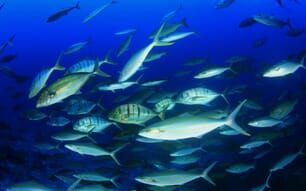Thailand’s government is considering a plan to permanently open the gates on the Mun River dam in hopes of restoring the river basin ecosystem and reviving livelihoods along one of the country’s primary Mekong tributaries. Since its over-budget construction in the early 1990s, the Mun River dam has decimated the fish population, displaced communities and failed to deliver profit for investors.
Similar risks may accompany the proposed Xayaburi dam, slated for construction on the Mekong River mainstream in northern Laos, because of critical gaps in the understanding of fisheries, biodiversity and sediment movement on Asia’s most biodiverse river.
At stake, according to WWF, are the livelihoods of tens of millions of people in the region.
“The Mekong is a unique and particularly complex ecosystem that hosts the most productive inland fisheries in the world and is second only to the Amazon in number of fish species,” said Dr Suphasuk Pradubsuk, National Policy Coordinator with WWF-Thailand.
“The lessons of Thailand’s Mun River dam are still fresh: Hasty environmental and social impact studies can lead to a bitter lose-lose situation for both fishermen and dam owners.”
At $233 million, the Mun River dam cost investors twice the original estimate, and energy production fell to a third of expected capacity during the dry season. Return on investment dropped from a projected 12 per cent to five per cent.
“All promoters of hydropower in the Mekong must learn the lessons of the Mun River dam,” said Dr Suphasuk. “Current limited baseline studies do not sufficiently explain how the different parts of the ecosystem interact, so we can’t accurately predict the effects of any mainstream dam.”
“The stakes are very high for people and nature, and therefore for investors as well.”
The Xayaburi dam in Laos, the first to be proposed on the lower Mekong mainstream, is just ending the “consultation” phase stipulated under the procedures of the Mekong River Commission (MRC). This is meant to ensure a rigorous and transparent scientific assessment of the impact of the dam.
A number of Thai banks, including Bangkok Bank, Kasikorn Bank, Krung Thai Bank and Siam Commercial Bank, are planning to support the Thai developer CH Karnchang PCL on the Xayaburi project.
“From an investor standpoint, this project is risky, plain and simple,” says.Suphasuk. “Developers and investors should consider the reputational risk of damming Asia’s most biodiverse river.”
“Only the Kasikorn Bank has had discussions with WWF about the risks of the project, while the Bangkok, Krung Thai and Siam Commercial banks have not responded to WWF’s requests to meet.
“The banks could only benefit from discussing the risks before making such an important decision for the people and ecosystem of the Mekong River, as well as for their own profit and corporate image.”
The just-released Xayaburi feasibility study gives no indication that any of the Mun River dam lessons have been learned, WWF noted.
“The study blandly assures us that impacts of the Xayaburi dam would be low level, without providing anything much to justify this optimism,” said Phansiri Winichagoon, WWF-Thailand Country Director. “Dam proponents were equally bland about impacts on the Mun River too, but there was economic and environmental disaster lurking in what was ignored and what was only superficially considered.
“This study falls a long way short of current best practice in environmental assessment.”
WWF supports a 10-year delay in the approval of all lower Mekong mainstream dams to ensure a comprehensive understanding of all the impacts of their construction and operation.
Alternatively, WWF and partners promote using assessment tools to assist decision making for more sustainable hydropower projects which could have much less impact on fish migration or sediment movement.
New Dam Loooms, As Failed Dam Closes
THAILAND - Investors in the proposed Mekong River dams need to absorb the lessons of the Mun River dam, a notable economic failure as well as the cause of massive environmental and social disruption, warned the World Wildlife Fund (WWF).

